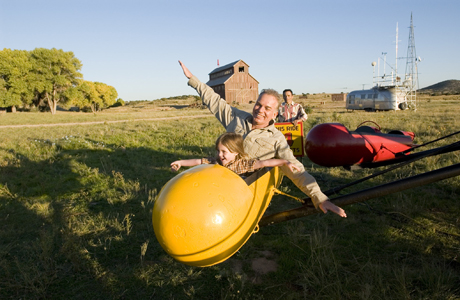« The Lives of Others (2006) – Movie Review | Home | Becket (1964) – Movie Review »
The Astronaut Farmer (2006) – Movie Review
By Robert L. Jones | February 24, 2007

Come fly with me, come fly, let's fly away: Billy Bob Thornton has stratospheric dreams in "The Astronaut Farmer"
Barn Burner
[xrr rating=3.5/5]
The Astronaut Farmer. Starring Billy Bob Thornton, Virginia Madsen, Max Thieriot, Jasper Polish, Bruce Dern, Mark Polish, Jon Gries, Tim Blake Nelson, and J.K. Simmons. Music by Stuart Matthewman. Cinematography by M. David Mullen, A.S.C. Edited by James Haygood, A.C.E. Written by Mark Polish and Michael Polish. Directed by Michael Polish. (Warner Bros., 2007, Color, 104 minutes. MPAA Rating: PG)
A man wearing a spacesuit rides horseback across the sand dunes of a barren desert. He moves right-to-left, which spells trouble in movies’ silent language. There, he finds a calf that has strayed from its mother, lying in the sand. With a firm but gentle hand, he returns the lost beast to the herd.
It’s a scene whose incongruous visual elements reminded me of the 1968 sci-fi thriller Planet of the Apes. But this isn’t some spaceman marooned in a strange place; it’s the movie’s earthbound hero, a Texan named Charles Farmer (Billy Bob Thornton). A graduate of the University of Texas aerospace engineering program and one-time member of NASA’s astronaut program, Charlie left the space agency decades ago to run the family ranch after his father’s untimely death. Yet, through all the years of operating the ranch and raising his own family, he hasn’t let go of his dream of defying gravity.
In his barn, Charlie works obsessively, day and night, to build a rocket that may help him realize his dream. He models it after 1950s-era Atlas missiles, using salvage parts he buys on the cheap from rocket graveyards. His supportive wife, Audie (Virginia Madsen, enjoying a rewarding second wind onscreen), and their three kids get caught up in the daily up-and-down drama of his quest; indeed, his first-born, son Shepard (Max Thieriot), was named in honor of the first American in space, Alan Shepard.
However, their neighbors in the farm community regard Charlie as the town oddball, a frustrated man going through a bizarre mid-life crisis. There’s even an ongoing bet among the locals as to whether he “will ever go up, or blow up.” When he attends show-and-tell at his daughter’s elementary school in his spacesuit, her teacher humors him: to spur the kids’ imaginations, “we need more parents willing to dress up.” Foremost among Charlie’s woes: to finance his idea, he’s gone into hock for over a half-million dollars to the local bank, and they’re about to foreclose on his ranch for delinquent payments.
What I like about Thornton’s portrayal is that it actually justifies the townsfolk in pigeonholing him as a square peg. A quixotic figure with a bit of a mean streak (when he receives a foreclosure letter, he throws a brick through the banker’s plate-glass window), he reminds me a little of Anthony Hopkins’s quirky Burt Munro in The World’s Fastest Indian. But, when push comes to shove, Thornton recalls Burt Lancaster in so many of his tough-guy Western roles.
When Charlie forwards his flight plan to the FAA in anticipation of his expected launch, government officials dismiss him as a crank. But when he attempts to purchase high-grade liquid rocket fuel, he opens a can of alphabet soup: the FBI, CIA, FAA, NASA, and a host of other agencies descend upon his ranch to stop him. Even the local Child Protective Services closes in when Charlie decides to home-school his kids and draft them into his “space program.” In typical bureaucratic fashion, the CPS agent diagnoses the children, long-distance, as “brainwashed and violated,” and threatens his wife: “It’s about time you take charge of your family before someone else does it for you.”
A visit to his lawyer makes Charlie more aware of the pressure the government intends to apply. “With the Patriot Act,” the attorney tells him, “they can do whatever they want if they think it’s a threat to homeland security.” He advises Charlie to “embrace the media, invite them in for your protection.” Next, an astronaut from the old days (Bruce Willis, in an uncredited cameo) shows up to try to talk his eccentric friend out of his scheme. “They don’t let civilians into outer space, they let astronauts into outer space,” he says. We then learn that he’s been sent at NASA’s behest, because if successful, Charlie’s shoestring-budget launch could embarrass the space agency, which needs to defend its multi-billion-dollar budgets.
Eventually, Charlie defends himself before a meeting of federal officials in words that express the aspirations of the lone creator against the regulatory state and the pessimistic mindset:
It’s not your right to tell me whether or not I can launch into space…. I know we have laws; we’ve got all kind of laws. We’ve got more laws that tell us what we can’t do than anything else…. You see, when I was a kid they used to tell me that I could be anything I wanted to be. No matter what. And, maybe I am insane, I don’t know, but I still believe that. I believe with all my heart. Somewhere along the line, we stopped believing that we could do anything, and if we don’t have our dreams, we have nothing.
Soon after, in a fit of desperation, he launches his rocket, using an unstable kerosene-based fuel mix. It leads to disastrous consequences, but…
Well, I don’t want to give away the ending. Let’s just say that The Astronaut Farmer isn’t just a “feel-good movie”; it’s a preposterously “feel-good movie.” Its plot has to be taken with a grain of salt, but then, so does movie popcorn. I don’t go to the movies to bask in the mundane or to nitpick at continuity errors; I go to be entertained, perhaps even enlightened. And the Polish brothers tell a highly entertaining and sometimes thought-provoking tall tale.
In a way, I found The Astronaut Farmer to be one of those unbelievable flicks that you can truly believe in, because its creators take the preposterous seriously. That, and an expertly suspenseful buildup, makes all the difference. Somehow, they were able to take the plot of the forgotten Andy Griffith 1979 TV movie Salvage One, seize the theme of Francis Ford Coppola’s Tucker: The Man and His Dream, mix in cinematic references to John Ford Westerns and Apollo 13, and yet make it all jell. The movie’s only real drawback is an undistinguished soundtrack.
Credible acting enhances the story’s credibility. Billy Bob Thornton brings to the role of Charlie his quiet, idiosyncratic, yet steadfast demeanor. For her part, Virginia Madsen exudes a natural warmth and unflagging conviction. The supporting actors are well-cast, too, including sisters Jasper and Logan Polish as Charlie and Audie’s daughters; Bruce Dern as Audie’s cantankerous, aging father; and J.K. Simmons as the gruff FAA official who keeps setting up bureaucratic roadblocks in Charlie’s path.
What I most enjoyed, however, is that The Astronaut Farmer is a great family movie, as entertaining for the kids as it is for their parents. One of my earliest childhood memories is from late one night in July 1969, when I was four years old. My father woke me up and took me to the living room television set to watch Neil Armstrong walk on the moon. Lately, I’ve been thinking that perhaps I’ll never get to share a moment like that with my own son, who will soon turn two—that in his lifetime, man may never again set foot on the moon, let alone walk on Mars.
After watching Billy Bob Thornton’s unwavering, “can-do” performance for almost two hours, however, those dim prospects somehow seem to grow a little brighter.
Robert L. Jones is a photojournalist living and working in Minnesota. His work has appeared in Black & White Magazine, Entrepreneur, Hoy! New York, the New York Post, RCA Victor (Japan), Scene in San Antonio, Spirit Magazine (Canada), Top Producer, and the Trenton Times. Mr. Jones is a past entertainment editor of The New Individualist.
Topics: Dramas, Fantasy Movies, Movie Reviews, Sci-Fi Movies | Comments Off on The Astronaut Farmer (2006) – Movie Review
